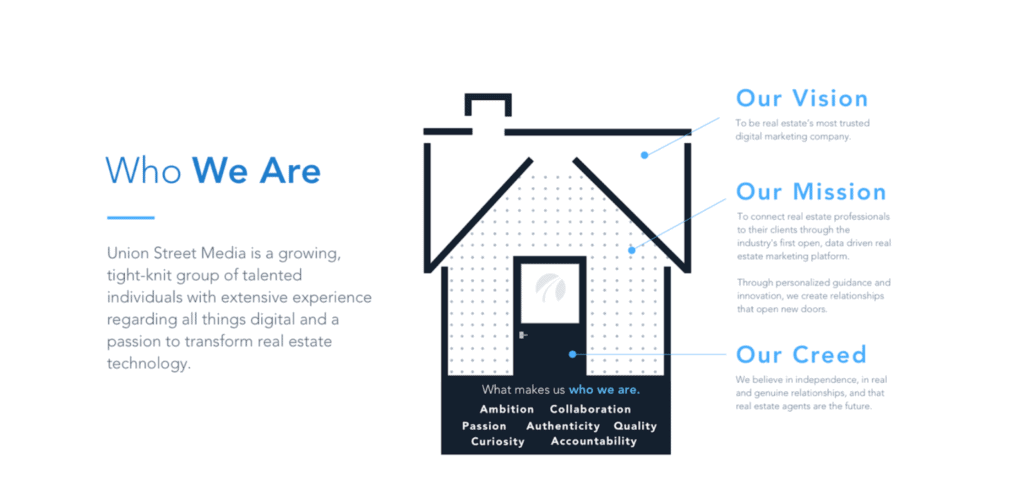How to Recruit the Agents You Want
The real estate industry is in an out-and-out battle for agent recruiting and retention. Again and again, this topic comes up as the single most important area of focus and single biggest challenge for most real estate companies. While there isn’t a silver bullet and we know it’s not usually possible to compete with some of the top tier offers, at times featuring million dollar bonuses and previously unheard of commission splits, there are things you can do to develop a top tier agent recruiting, engagement, development, and retention strategy. Here are some of the top ways to recruit real estate agents:
- Turn Your Agents into Raving Fans
- Engage Your Sphere
- Tap into Your Agents’ Spheres of Influence
- Use Targeted Advertising Campaigns
- Hold Live Events
- Establish and Communicate a Clear and Compelling Company Culture
- Get Creative and Diversify
- Have Great Careers Content on Your Website
- Know Who You Want to Hire
- Invest in SEO for Recruiting
- Show, Don’t Tell, Agents How You’ll Invest in Them
- Have a Dialed In Recruiting Process
Read on to discover how to leverage digital marketing, a strong culture, and an intentional process to tell a compelling story and be first to get in front of the next generation of top producing real estate agents.
1. Turn Your Agents into Raving Fans
One of the first questions to ask when thinking of how to recruit new agents to join your team is why do the people who work here today like working here? What is it about our company that makes people want to join and continue to work for it? There may be multiple reasons and that’s great. Making sure you truly understand why your agents are your raving fans, or if they’re not, how you can turn them into raving fans is the single most important thing you can do to develop a brag-worthy reputation that should be the cornerstone of your recruiting efforts. There are some things you can do to increase agent engagement and listening to your agents and asking for feedback is a great first step. Stepping into their shoes is step one and creating a positive, lasting experience is step two. Walk through your company to see how agents perceive their experience in dealing with you from start to finish. What do you provide your agents? What do you say you provide your agents? Are they the same? What is it like working for or with you? To be successful, it’s important to have a deep understanding of your customer and your customer is your agent. For inspiration, read Jeff Bezos’ famous 2016 Letter to Shareholders in which he reiterates why obsessive customer focus is essential. For real estate companies, obsessive agent focus can drive you crazy, and it’s absolutely critical. Agents are literally the reason your company exists, and the key to your future success.
2. Engage Your Sphere
One of the most effective ways to recruit new agents is to stay top of mind with the people who already know you and are more likely to trust what you have to say; your sphere of influence. Your sphere of influence (also called “SOI” or “sphere”) consists of the people who know you and know of you. Your sphere is your personal and professional network, including your family, friends, and people you know through affiliations like school, work, church, volunteering, sports, activities, and more. Your sphere of influence also includes your current agents and employees. The key with engaging your sphere is to create content that will resonate emotionally with them. You should be personalizing what you’re sending your sphere, actively having conversations, and further building your relationships with them. There are people in your sphere who work for you, people who know people who work for you, people who may work for you someday, and people who know people who may work for you. You should have strong relationships with all of these people and be regularly reaching out to them so you stay top of mind and your name is the first they think of when they’re considering changing companies or careers, speaking with someone else considering changing companies or careers, or looking for advice you can provide. Check out this article to learn more about how to nurture your sphere online and make sure you’re putting in the time to keep this valuable group of people aware, engaged, and interested in you and what you’re doing.
3. Tap into Your Agents’ Spheres of Influence
Look for opportunities to connect with your sphere on a personal level, in a way that’s also shareable. Not everything you put out there should be or has to be public. In fact, sending personalized emails and cards to your sphere is recommended. For content like social media content though, look for opportunities to celebrate people in your sphere publicly, so others can celebrate them too and your message both resonates more and gets in front of even more people. The more you can tap into your sphere’s spheres, the quicker you can grow your company’s exposure, and create interest that builds trust and eventually leads to action.
4. Use Targeted Advertising Campaigns
Per Comscore, people are 3x more likely to search for you or your company after being exposed to a display ad for you. And people overwhelmingly trust brand messages after seeing them across multiple channels, with 87% of Edelman Trust Barometer Special Report respondents saying they have strong trust in a brand’s message after seeing it across six channels vs. only 13% who have strong trust after seeing it once. Online advertising can be highly effective in reaching a specific audience with a message that’s tailored to them, at the right time, in the right place, and at the right frequency for that message to resonate with them. For agent recruiting, online advertising can be particularly effective as Google, Facebook, Instagram, YouTube, Microsoft’s Audience Network (which includes Bing, LinkedIn, and thousands of other websites), and other channels all allow for highly granular targeting, including targeting based on past behavior, such as people who visited your website, interest, such as job seekers, and email list, which is where your database comes in handy. You can use your contacts to create separate advertising campaigns targeting specific sub-segments of your sphere, such as current agents, people who would make good agents, or people who may know people who would make good agents, and serve them messaging specific to them. Tools also exist to do other things like create lookalike audiences in Facebook targeting people who behave like your current agents and your past agent prospects. You can also target people who have interacted with your ads, such as clickers, sharers, video viewers, etc. The key with these strategies, as with any online advertising, is to be intentional about how you segment your audience, what you say to them, and where you direct them. Their entire user experience, from the ads they see, to the landing page on your website where they land, should be personalized to them and consistent.
5. Hold Live Events
Holding live events is a great way to connect with people on a deeper level, especially if you focus on educational content. Depending on who your ideal agent is, this may look different for you than others. You can certainly host events geared around careers in real estate. Before the pandemic several brokerages with whom we work held regular career nights focused on helping people get started in or become more successful in real estate. Have fun with events and get creative. Not all events need to be focused on less experienced agents and not all events need to be real estate centric. Holding events to engage your sphere, including your agents and prospective agents, can be really effective. You may also be able to combine your efforts as some events can be great sources of buyer, seller, and/or agent leads. A good example of this is an investment seminar. A lot of people who invest in real estate are also licensed and simply do it part time. They may be in the market to buy, sell, or change careers. You can also think of events as a great way to showcase your company’s values and who you are. For example, think about putting on a speaker series featuring successful people in your community or even in your company. Let them tell their story. They’ll appreciate being asked to speak, others will appreciate learning from them, and you’ll be seen as the supportive organization that you are. You can also do things like host a virtual book club, hold an ongoing Facebook live “Town Hall” series where you answer questions from agents, create a “game night”, host a fundraiser, or start a competition for agents and their friends and family. The possibilities are endless!
6. Establish and Communicate a Clear and Compelling Company Culture
Company culture is a huge reason many people both switch and stay at their jobs. Many will argue that company culture must be organic; that it’s grown from within and your job is to hire amazing people who together create a great culture and then get out of their way. While there’s some truth in that, a positive company culture can be cultivated and is one of the most overlooked areas of agent recruiting. Answering the question of why someone would want to come work with you, or stay working for you, asking others the same, and being really honest where attention is needed are all key to starting this process.
A compelling company culture begins with clarity; a clear purpose for existing, a clear idea of what you want to be, and a clear idea how you’ll get there (at least partially). Your culture is your shared values, goals, attitudes, and practices. It’s the way people feel about the work they do, why they do it, the values they believe in, where they see the company going, and what they’re doing to get it there. In order to establish and communicate your company culture, it may be helpful to articulate your vision, mission, creed, and values. Your vision, or vision statement, is what you want to become and/or do. This statement should include “why” and “how”. Your mission statement addresses what you do, how you do it, and for whom. Your creed is what you believe and your values are what you believe is important in how you live and work, specifically. At Union Street Media, our vision is to be real estate’s most trusted digital marketing company. Our mission is to connect real estate professionals to their clients through the industry’s first open, data driven real estate marketing platform. Through personalized guidance and innovation, we create relationships that open new doors. When you read our vision and mission statements, a few things stand out. Firstly, trust, connections, guidance, and relationships are all mentioned. People are incredibly important to us. Secondly, we are a digital marketing company; we build technology and leverage data to empower our clients and us, and at the end of the day, we are in the business of marketing real estate.

Your vision and mission are important pieces to defining who you are and why you do what you do. You want to make sure you’re crystal clear on your must-haves and your nice-to-haves when hiring, when choosing vendors, partners, and more. Your company culture will help you attract and retain the kinds of employees and agents you want, and make quicker decisions when things aren’t a good fit. Once you have defined your company culture, including your vision and mission, it’s important to communicate it a million different ways to a million different people. Okay, maybe not literally – that’s a saying we use to remind us that everybody hears, experiences, and connects with each other differently. As leaders, it’s our job to motivate others, demonstrate commitment to the team, and communicate often, openly, and in a consistent and clear manner. You’d be amazed at how powerful that last skill truly is, and that’s how culture grows up around you. When you communicate the what, “high level” how, and why, others will fill in the white space and take your company to new levels you never imagined possible. Then, all you have to do is keep sharing your story.
7. Get Creative and Diversify
A lot of people we talk to about agent recruiting mention some of the same strategies to meet new people, or not even “meet” them, but just start contacting them. Sure, you could start emailing everyone in your MLS with a certain level of productivity and try to convince them to join your team. What are you going to say when you do? Also, are most of the agents who work for you and see the most success today lifetime agents? We often see companies focus on just known, top producing real estate agents and if that’s your thing, great, but then you shouldn’t be emailing all agents. If you are emailing all agents, then you’re likely missing out on the hundreds of highly qualified candidates in financial services, marketing, and adjacent industries. Or what about real estate hobbyists. How many people do you know became agents because they invested in real estate on the side and discovered they were good at it? If you’re like us, the answer is a lot.
The key to an effective agent recruiting strategy, as with any lead generation strategy, is to prioritize quality over quantity, get creative, and diversify. At Union Street Media, we see a shift away from traditional online lead generation toward user intent optimization, which relies on data to optimize marketing and content for unique user experiences. Put simply, it’s being really strategic about who you reach and how you engage with them. User intent optimization also relies on a truly omnichannel experience, meaning what your potential customers, or agents, experience when they’re on your website or see one of your ads is consistent with how you represent yourself when you talk or meet in person. User intent optimization entails everything from auto-optimizing how much you’re willing to pay to reach certain people based on how likely they are to be a future agent to tailoring the messaging they see in an ad to emailing them personalized follow up based on the last activity they took to engage with you, such as favoriting a specific listing or signing up for an online class.
Focus on lead quality indicators to match top of funnel behavior and decisioning with bottom of the funnel ROI. For example, how someone discovered you and what information they provided when they reached out (even as simple as a phone number with an email) can be strong determinants of their likelihood to want to work at your company. You can use data to increase how much you spend to reach certain segments based on indicators like these. Leverage multiple different strategies to reach potential agents – engage your sphere, use advertising to grow your sphere, hold live events – and throughout it all, focus on the user’s experience, your follow up process, and the quality of each interaction you have. Prioritize the highest quality interactions, but don’t ignore the others. There are plenty of lead follow up strategies you can use for agent recruiting, just as you would for buyers or sellers, but the key is to leverage multiple approaches – start broad – and relentlessly track them, to get super specific.
8. Have Great Careers Content on Your Website
There’s no substitute for a great website. Even people who hear about you from someone they know are going to look you up online. However and wherever you’re looking to connect with agents now, having an amazing website with really clear, compelling content that’s optimized for people and search engines should still be the cornerstone of your digital marketing strategy for agent recruiting. Spend time developing your careers content. Mix up the type and format of content to improve engagement. Leverage high quality and brand consistent visuals, insightful and engaging text, interactive features if that’s your thing (we like simple sliders, interactive widgets featuring things like testimonials you can scroll through, hover effects over various images or calls to action, and interactive polls and forms people can fill out). Websites are important for link building so make sure you have a great linking strategy for your careers content too, both throughout your website and offsite (sharing it other places is great, but it’s best if you can get partners, affiliates, local organizations, and others to link back to it as well). Links are essential for SEO and they are even more important for referrals. More than anything else though, view your website careers content as the place to share more about who you are with your prospective and current team (as well as your clients, I might add). We love how Portside Real Estate Group tells the story of who they are and really evokes a sense of self through their careers content. Reading through you can really get a sense of what the Portside Real Estate Group, and Dava Davin, value, and can easily determine whether those are values you share. Check out this article for tips on how to build your brand online and seek to create a Portside-like experience for your website visitors.
9. Know Who You Want to Hire
One of the most important parts of any marketing strategy, including agent recruiting, is to clearly define who your ideal customer is. The reason why is because the more clear you are on who they are, the more clear you can be on what value you add to their lives, and how you need to communicate to them to maximize the effectiveness of your marketing. The same holds true for agent recruiting. Is your company best for full time agents with 10+ years of experience who have a clearly defined specialty? That’s important to know. Is your company a place that provides extensive training and is perfect for high potential individuals regardless of their experience level? Great. There’s no right or wrong when it comes to who you’re looking to attract, it’s just important to know it in advance and be really intentional about making sure how and what you’re communicating is consistent. That includes what you say on the phone or in person when you interact with potential agents, so really be thoughtful about this and it’ll save you time and hassle down the road.
10. Invest in SEO for Recruiting
Search engine optimization is still one of the most effective marketing strategies to generate visibility for your company, attract visitors to your website, and get leads. Yet most real estate companies think of SEO as a buyer lead generation strategy, overlooking it as a tool to reach, engage, and monetize other valuable audiences such as sellers and prospective agents. The great thing about SEO for agent recruiting is that it’s a far less crowded space than SEO for buyers and sellers and you can get really creative about how you capture possible recruits, both people actively looking for a new company or new career, and those not actively looking for a new opportunity. The key is to tap into our curiosity and Google is the best place for this. Consider this – question based searches have increased dramatically on Google and many searches (up to 50% at time) have never been searched before. This is because of the growth of voice assistants and the ease of searching by voice today. We’re curious, and we’re lazy. People even search for websites far more than you’d think, because it’s just as fast to search for things like chewy.com than to type a website URL into your browser (and because of the growth of Chrome, thanks, again, to Google). We’re addicted to searching online and that drives our behavior. For real estate companies, this presents a huge opportunity.
In recent years, question based search queries (both short answer questions, or SAQs, and long answer questions, or LAQs) have continued to grow to the point where specific query formats, like searches for “is __ worth it?” have increased by 80%. Real estate companies can take advantage of this by optimizing all of the amazing careers content you’ve created on your website – or creating it if you don’t have it yet – to be in a question and answer format. “Is getting my real estate license worth it?”, “Is real estate investing worth it?”, “Is changing jobs during a pandemic worth it?”, “Is buying during a seller’s market worth it?”; odds are that you already have content, or at the very least, are having conversations with people about these topics. All that stands between you and a lot more traffic to your content is simply updating the layout of the written content you have on your site, such as your blog posts, and making sure it has the right title tags, meta descriptions, h1s, h2s, URL format, and all of the other technical details.
Google also has a feature called Featured Snippets, which is when the answer to a question is displayed at the top of a search results page in what’s called position zero, that allows your content to rise above everything else, even ads. This answer box includes a summary of the answer, taken from your website, and a link to the page. As long as your website is optimized with the right metadata, URL structure, and most importantly, schema, or HTML markup, for Google to read and very quickly recognize where you’re answering questions, you can be at the top of Google’s search results. Because many overlook this strategy to capture the attention of potential agents, you could do it, and do it well, long before anyone else realizes why you’re consistently number one. Of course, search engine optimization for other topics beyond just careers content matters as well – prospective sellers could also be buyers or agents, and visa versa – but this is a great place to start to stand out from the competition and start to attract more interest without having to invest a lot.
11. Show, Don’t Tell, Agents How You’ll Invest in Them
It’s really important to have great careers content on your website, to develop videos that help people get to know you on a personal level, to have a strong brand so it’s clear what you stand for and why someone would want to join your team, and to be proactive about consistently making recruiting part of your marketing strategy. The most important thing, though, is to back up what you say with action, and the best way to do that is to show your agents how they’ll be successful by joining your company. The way to do this is to market to them as if they’re a buyer or seller, so they can literally see in action what you’ll be doing to help grow their business. Check out these articles below on things you should be doing anyway to grow your business that double as really effective strategies for recruiting top producing agents and seasoned professionals to join your team.
- How to Get More Listings Online
- How to Get Buyer Leads
- How to Build Your Brand
- How to Nurture Your Sphere
12. Have a Dialed In Recruiting Process
Whatever your recruiting process is, the best real estate agent recruiting process is the one that you can commit to consistently. Effective agent recruiting isn’t a once-in-a-while kind of thing. Rather, it’s an ongoing, proactive process that involves engaging with prospective agents, current agents, and even former agents strategically and reliably. Your agent recruiting process should cover everything from the actual marketing of your business and recruiting part of the process, during which you get agents to want to join your team, to selection and hiring, onboarding and development, and engagement and retention. Too often are these phases looked at in silos as opposed to part of a holistic agent recruitment and retention process. Having a plan to ensure new agents are productive by the end of their first year – or whatever timeline makes sense for your business – can have a significant impact on your ability to attract and retain high potential agents, which also directly impacts your revenue. Nobody wants to be showered with attention before they’re an employee only to feel left on their own once they sign on the dotted line. In real estate, it’s even more important to show your new agents continuous support because their success is your success. You quite literally are depending on them to bring in revenue through their own sales and to bring in revenue through recruiting others. After all, this is real estate and whether or not they’re directly incentivized to recruit agents to be part of their own team or the company, your agents make the best salespeople.
A lot of companies now either use separate recruiting CRMs or create dedicated instances within their primary CRM just for recruiting. Managing the entire process is very time-consuming. Individual needs may include marketing events targeted toward prospective agents (like classes), keeping track of applicants, organizing interviews, preparing offers, and signing paperwork, developing and administering training curriculum, and managing outreach to past-candidates and others with whom you want to stay in touch, such as partner organizations like a local leadership program, universities, and more. In addition to CRMs, recruiting software exists to streamline many of these processes and many integrate with other tools, such as the DISC assessment or Predictive Index for hiring, franchise, custom, or third party training portals, and some of the current intranet solutions. For a good all-in-one option, we like Konverse. Regardless of the technology or process you use for agent recruiting, give your candidates, and your agents and employees, the attention they deserve by making it part of a holistic employee recruiting, engagement, and retention program. We promise it’ll be well worth it.
These are just a few strategies you can leverage to recruit and retain top real estate agents. Contact our team to learn more and discuss how we can help you with your recruiting goals.










